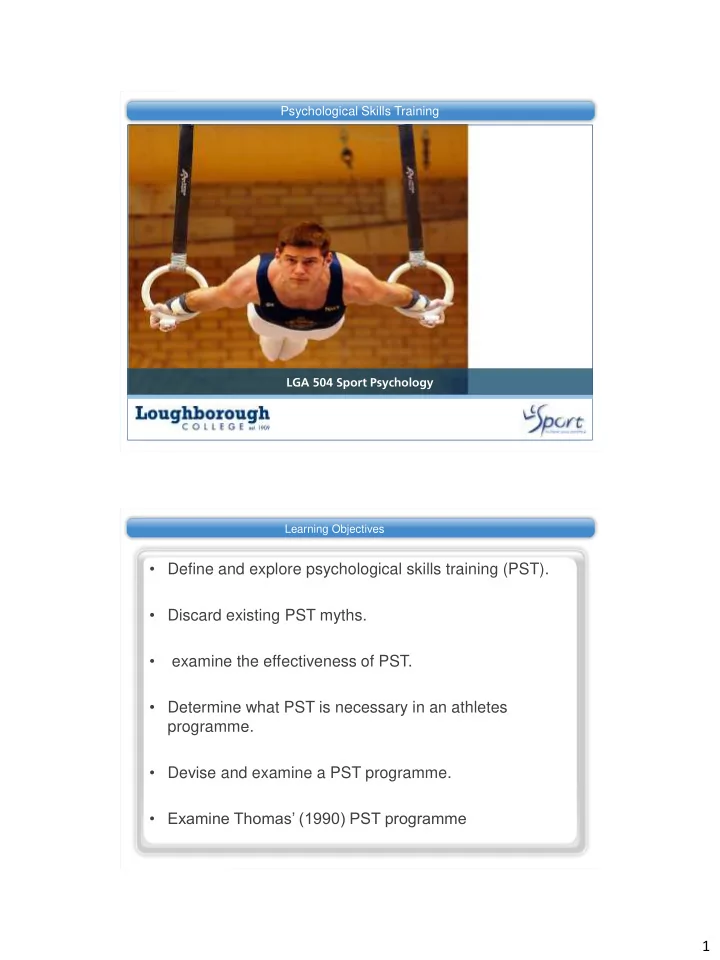

Psychological Skills Training LGA 504 Sport Psychology Learning Objectives • Define and explore psychological skills training (PST). • Discard existing PST myths. • examine the effectiveness of PST. • Determine what PST is necessary in an athletes programme. • Devise and examine a PST programme. • Examine Thomas’ (1990) PST programme 1
Introduction to Psychological Skills In elite sport the difference between winning and losing can be marginal down to hundredths of a second e.g. European Athletics 100m sprint final Barcelona 2010 ò Men's 100 metres PST refers to systems and constant practice of mental or psychological skills for the purpose of enhancing performance, increasing enjoyment or achieving greater sport and physical activity self satisfaction. Mental skills can Help DEVELOP your help to provide the technical, physical and ‘edge’ required to be tactical skills throughout ò Vancouver 2010 your playing career successful and need Snowboarding 1 to trained the same Help you to effectively as physical skills. EXECUTE technical, physical and tactical skills S on court in training and Vancouver 2010 snowboarding 2 competition Why is PST Important PST programs can sometimes be comprehensive and involve a variety of skills. Or they might focus on just one or two skills. The practical constraints of a situation (e.g. only a few weeks to learn and implement a PST program) might dictate the type of program that would be most beneficial. All athletes at some point in the career fall victim to mental let downs or mistakes. Image Scully & Hulme (1995) found mental http://www.flickr.com/photos/geckoam/2723280142/ toughness was perceived to be the most sizes/o/in/photostream/ important determinant of success in elite Some Sport Psychologists neglect PST’s sport. Lack of Knowledge In major competitions highlight the difference between gold, silver and bronze Misunderstandings About Psychological Skills or no podium finish at all. Lack of Time 2
PROPERTIES Allow user to leave interaction: Anytime Show ‘Next Slide’ Button: Show upon completion Completion Button Label: Next Slide PST Knowledge Base Research on Elite Athletes: Williams and Krane (2001) Successful athletes also achieve peak performance by using the mental skills of goal setting, imagery, arousal control and management, thought control, competitive plans, coping strategies and mental preparation routines. Experiences of Athletes and Coaches Gould et al (1981) rated relaxation training, concentration, imagery, team cohesion, concentration & attention training and self talk Although there were evidence of individual strategies as very important topics. programme differences, coaches and athletes found the following topics useful in PST programs: Studies with Olympic athletes (Gould, Guinan, Greenleaf, Medbery & Peterson, 1999; Greenleaf, Arousal regulation Gould & Dieffenbach, 2001; Orlick & Partington, Imagery (mental preparation) 1988) revealed athletes had developed plans for Confidence building competition, performance evaluation and dealing Increasing motivation and commitment (goal setting) Attention or concentration skills (self-talk, mental with disruptions. plans), They set daily training goals and used simulations Coping with Injury. in practice to replicate competitive environments. 3
PROPERTIES Allow user to leave interaction: Anytime Show ‘Next Slide’ Button: Show upon completion Completion Button Label: Next Slide Implementing PST’s When to Implement a PST Self Regulation: The Ultimate Goal of PST ‘Off season’ or ‘preseason’. Ultimate goal of PST is to have athletes effectively function on their own. It can take several months for an athlete to Kirschenbaum (1984) Five-stage model of athlete become successful at PST. self regulation: 1. Problem Identification The first or last 10 to 15 minutes of practice 2. Commitment is often a good time to implement PST. 3. Execution 4. Environmental Management 5. Generalisation Who Should Implement / Conduct PST Programs? • ability to 'read the play/situation' A PST program should be planned implemented • acquired knowledge and supervised by a qualified sport psychologist. • decision-making skills Coaches can be in a position to administer psychological interventions over the course of a season. C 4
PROPERTIES Allow user to leave interaction: Anytime Show ‘Next Slide’ Button: Show upon completion Completion Button Label: Next Slide Designing and Evaluating the PST programme: Designing a Schedule What techniques appeared to work best? Short meetings before or after training 1 or 2 Was enough time allocated to practice the psychological skills? days a week. Informal meetings build rapport. How useful were the team sessions? Develop PST as part of daily training. How useful were the individual sessions? Was the consultant available? Evaluating the PST: Provides feedback for gauging the programmes Was the consultant knowledgeable and, effectiveness. informative and easy to talk with? Suggest changes in the programme. Should anything be added to or deleted from the programme? Objectively judge whether the program has achieved its goals. What were the major strengths and weaknesses of the programme? Interviews and written rating scales to supply both qualitative (words) and quantitative (numbers) Lack of Conviction feedback. Common problems in implementing Lack of Time The following questions are useful for PST programmes evaluating the effectiveness of a PST programme: Lack of Sport Knowledge 5
PROPERTIES Allow user to leave interaction: Anytime Show ‘Next Slide’ Button: Show upon completion Completion Button Label: Next Slide Summary • Psychological skills Training refers to learning to systematically and consistently practice psychological skills for the purpose of enhancing performance, increasing enjoyment or achieving greater sporting satisfaction. • For an effective PST it is important to identify a step by step process which is tailored to the athlete’s specific needs. 6
Learning Objectives • Define and explore psychological skills training. • Discard existing psychological stills training myths. • examine the effectiveness of psychological stills training. • Determine what psychological stills training is necessary in an athletes programme. • Devise and examine a psychological stills training programme. • Examine Thomas’ (1990) Psychological Skills Training programme PROPERTIES On passing, 'Finish' button: Goes to Next Slide On failing, 'Finish' button: Goes to Next Slide Allow user to leave quiz: At any time User may view slides after quiz: At any time User may attempt quiz: Unlimited times 7
Recommend
More recommend